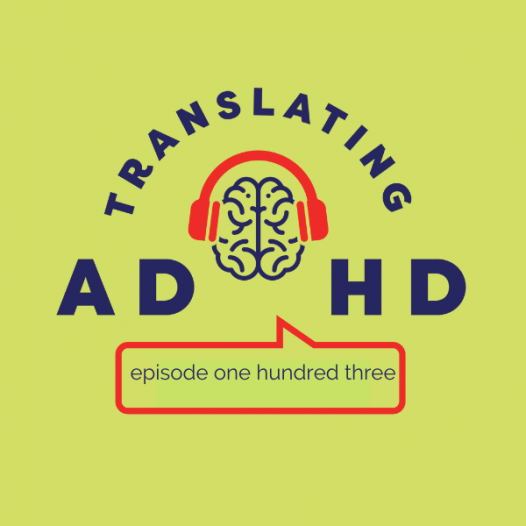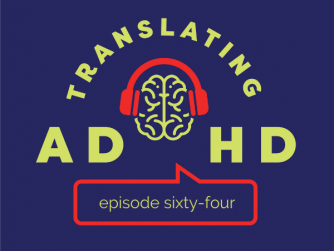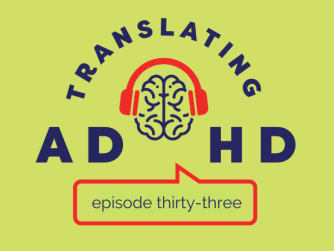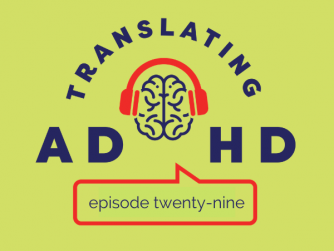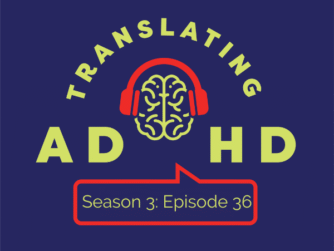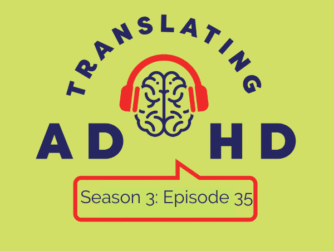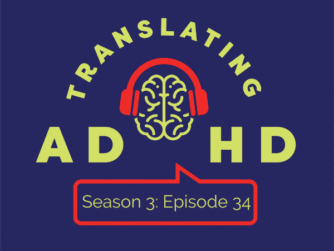Shelly and Cam continue with the ever-expansive topic of context with respect to ADHD with a deep dive into how our unique wiring is connected to our unique value at work and in the world. In this episode, they explore how contextual wiring presents in a few examples and how to leverage this ‘super strength’ throughout the week. They distinguish how big value is not the same as the big signal (episode 80). Our big value is often downplayed or dismissed because of societal norms and our own negative internal dialogue.
Shelly shares how vulnerability and integrity informed a choice to no longer ‘play small’ and step closer to her own compelling Why (episode 101). Finally, the hosts discuss how getting stuck in ‘ivory tower’ thinking can inhibit exploration and experimentation.
Episode links + resources:
For more of the Translating ADHD podcast:
- Episode Transcripts: visit TranslatingADHD.com and click on the episode
- Follow us on Twitter: @TranslatingADHD
- Visit the Website: TranslatingADHD.com
Episode Transcript:
Shelly: Hi, I’m Shelly.
Cam: And I’m Cam.
Shelly: And this is translating ADHD. This week we’re going to continue pulling on the thread of context, but before we do a quick reminder that our next coaching group is open for application. You can visit the website, translating adhd.com, click on the group coaching link. And there, you will see our upcoming coaching group of agency, which begins January 19th.
We meet at 8:30 PM Eastern. If you’re interested in joining this group, the first step is to apply. If you’re not sure if it’s a right fit for you or not, this is why cam and I ask the questions that we ask so that we can help you make sure that this is going to be a great experience for you and for everyone else in the group.
So if you’re unsure, go ahead and apply it. Doesn’t commit you to the group. It just opens up a conversation. So K. We’ve been on context for a while now. And it’s been producing some really interesting conversation, both here on the podcast where we’re recording and also individually in the work that you and I are doing outside of the podcast, which is so fun.
Where are we going today as relates to context?
Cam: Uh, where are we going today? Where are we going today? Shelly is I’m sitting over here just so excited about today’s deep dive around context and this whole term of wired for context when Shelley and I think about it, we’re thinking about this unique way that we see the world.
and that both of us believe that the world needs our way of seeing the world our unique perspective. And so it’s taking this wired for context and seeing what’s the value of that, right? That when I work with people, this is the central work that I do with individuals is to identify the super strength around their, why.
And how they’re sharing it with the world, but really, you know what it is, Shelly. It’s getting my clients to really own this super strength because there’s so many different messages in the world that like, you know, internal and external that are letting them know of like, oh, maybe this is not a super strength or it’s so easy.
Right. doesn’t mean anything. And yet it’s such a game changer.
Shelly: Just want to jump in and throw in a caveat for our listeners as you use the term super strength, which I agree with by the way. Cam, that we are not. The people that say ADHD is point blank a gift. And if you don’t see that you’re wrong, we also don’t say ADHD is a curse. We believe it’s either both or neither.
And the work that we do with our clients, what we’re teaching you all, how to do here on this podcast. Is learning how to tap into your strengths so that you can lead with strength so that you’re not leading from challenge, which is leading from one down. And Cam, I agree with you when clients are able to really start to tap into this particular strength, something that is already on board, something that is already showing up for a lot of our clients in terms of where they’re being successful. It’s amazing. It really is a game-changer, but just wanted to sort of temper that language with we are not. Changing our stance here.
This is not going to become okay. ADHD is a gift just to happen to your hyper-focus bro. And you got this. That’s not us
Cam: That’s right. let’s get us into a dopamine state. Let’s go, go,
Shelly: get the flow state going. Yeah, not us. Totally not us, but could see how that language without the context. See how context is important. might sort of make our listeners ears perk up and say, Hmm.
So just wanted to clarify that now. Continue.
Cam: thank you for that. And so, what we’re about is being able to look at it as a complex issue. Three-dimensional that there’s strength and there’s challenge, right? To be able to hold two, seemingly. Thoughts or takes on this, that’s what we’re all about, That the nuanced signal in the nuance and what is in the subtlety of how we work in the world, it’s being able to recognize what we’re really good at, but also be aware of the challenges to be able to sidestep or find support around that.
So thank you for that. that said so wired for context. And why is it that we, first of all, kind of don’t really recognize our strength and then stay with it. We’ve been talking about this on this podcast for almost two years now, or over two years, Shelly.
Right. We just passed our two year anniversary didn’t we? We didn’t even celebrate that.
Shelly: Wow. We’re for as much as we advocate celebrating completions, we’re doing a pretty poor job here on the podcast.
Cam: I know. We started on November 6th, 2019.
Shelly: Well happy two years, Cam.
Cam: a happy two years, it is the 15th of November right now. And this will drop Monday before Thanksgiving.
Shelly: time flies when you’re having fun.
Cam: Yeah. So Now when we laid out the, Mount Rainier metaphor and the challenge of cause and effect and the lunch counter, that barrier between our manifestation, our experience. And getting to causation and we lose our path. Right. We’ve talked about the Pilgrim on the path and the index cards.
And were so diligent in building out our index cards of values and needs and strengths and challenges. And then we set them aside and we forget that. And it’s like coming back around to, oh yes, this is who I am. And this is where I bring value. And one of the ways we bring value is in our strength around being wired for context.
Shelly: Not only do we have the challenge of not being good at reflecting on and learning from our own lived experiences, ADHD people. We’re also looking around at the context around us and what’s modeled for us the neuro-typical approach at work at home at school. We’re looking at what’s modeled for us. And we’re trying to emulate that this is what works for other people.
This ought to be what works for me as well. So it’s this dual thing of not really learning from our past experiences in a useful way, and also having modeled for us approaches and ways of thinking that don’t work because our brain doesn’t know. See and process and experience the world in the same way that a neuro-typical brain does.
Cam: And so there’s context in the sense that context informing our experience. We are externally wired, we’re looking for models. And so we look and what do we see around us? All of these neuro-typical constructs that are erecting certain things that we value, accountability, time management, reading, writing, arithmetic.
Memorization. And so right there, there’s that neuro-typical exterior world. There’s also the big signal, right? When we’re hunting for the big signal, we often mistaken that for our big value. And I will say that the big value is different from the big. The big signal is that shiny object, that idea it may be in your wheelhouse, but sometimes it’s not.
And coming back to and doing work around really thinking about what is your ad value? What is that unique thing that you bring to the table that is really needed in the world? And as you were saying that I’m reminded of a client who is such an exotic Right and exotic in the way that she sees the world.
And here’s the interesting thing is often she will get into her work, get so busy and so overwhelmed with so much to do. She forgets her exotic stripes. She forgets that and starts to default back to, oh, there are these other firms that are doing this this way and I have to do it that. But she falls back to that old messaging of success is this way.
And so there’s that external looking out and not coming back to who am I, what is my unique offering here? And so that’s the thing that really is the opportunity today. Listen, Is to pause, right? That reflective practice. Last week, we talked about that tool of pause, disrupt and pivot. It’s a great thing you can do here is if you’re going through your week, chasing the signal or chasing messages from the outside is to pause that disrupt.
And consider What’s my unique offering. How much have I been in my unique offering this week? Right. Showing up in a way that I bring real value. What I mean by that is. Just want to give you a couple of examples, listeners of what does this mean? What does it mean to have these exotic stripes and be wired for context?
This is where we see things that others don’t because in a neuro-typical fashion, it’s about hierarchy. It’s about rules, authority. It’s about being an expert in a singular area. And not having that visibility of being able to see the whole scene, right? The forest through the trees. We can often appreciate patterns that others can’t go back to middle school and you come up with the answer and the teacher is like, how’d you get that?
And you have no idea how it happened, but it. Right. So being able to see stuff that others don’t and make these connections part of the dilemma is we have it. Can you articulate it to your audience where it’s received with value?
Shelly: So cam this is a huge concept and I think it might be helpful to bring in a really concrete example here. How about the one that started this show over two years ago, for those of you who have not listened to the entire back catalog of episodes, which at this point is an overwhelming task and it’s understandable that you haven’t.
I would like to briefly tell you how this podcast got started. I spoke at the national association of organizing and productivity professionals for the first time. And for those of you who don’t know this, I come from a background of professional organizing. So this was the first time that I was speaking to and attempting to educate my peers.
And the topic was ADHD and time management. And what I knew I didn’t want to do from the onset was give the same clinical talk that stays in behavior. And that prescribes solutions that these professionals have heard in some form over and over again at every conference they attended.
Instead, I wanted to help them better understand what is happening for their ADHD clients. When they see symptoms of poor time management, what’s really going on. And that’s not an easy answer, as you all know, because we’ve been doing this for two years and we’re still articulating things that could be going on.
It’s about individual manifestation, but I thought at a high level, I just want these practitioners to understand. Y when they prescribe solutions to their ADHD clients in the realms of organizing or time management, why those things alone don’t work and what the other work is that an ADHD client needs to do in order to have successful outcomes there.
And so I went and I gave my talk and I had no idea how it was going to go. I knew what the goal was, didn’t know how it was going to go. And it went over. Better than I could’ve ever imagined. I could not take two steps in any direction for the rest of the conference, without someone stopping me to tell me how much they’ve learned to ask me some more questions to tell me what a great presentation it was.
And so that had my intent. And as I was talking to Jen, my former business partner after this presentation, like, what is this? What have I stumbled on? She said, it sounds like you translated ADHD. Boom. That was a whole new understanding of my value. Is the ability to stand up in front of a room of mostly neurotypicals and talk about the ADHD brain and have it be understood.
And that is the font from which all of my work is now informed. This podcast clearly came from that concept, given the title, my coaching work. I’ve developed a deeper understanding of what is it that I do with my clients? Well, one of the things I do with my clients is to help them better understand their own experiences and to form language around those experiences so that they can articulate to others so that they can advocate for what they need.
And so you see how that one piece of context that wasn’t there before is now informing across every area of my life, because it’s a strength that I now know. Is there something that I’ve named and something that I’m always looking to leverage in new ways?
Cam: That’s a great story. And so let’s go back before the talk. Right.
And what was your awareness of that strength? The strength of being able to look at a situation and translate. So it makes sense for others.
Shelly: it’s a great question. And I will say I was aware of it on a much smaller level in my individual work with my clients, for example, something that used to happen frequently and only doesn’t happen now because clients are coming to me after listening to the podcast first. But something that used to happen is in our first one to three sessions. My client having a moment of holy cow, someone else understands me. And that moment would usually come after I’ve asked a question and they answer, and with our contextual brains answers can get lengthy, right? As we’re pulling on the different pieces that are coming up as the client is adding context for me, so that I fully understand this backstory and what it means to them.
And then they get to the end of their story and they say, did that make sense? Because they’re so used to losing people in a story like that. And my response being, yes, it did. I heard this very succinctly in a few sentences, summing up what I heard and their response being, wow. Someone else understands me.
This is the first time in my life that I’ve felt like someone else really gets. So there’s that. And then even prior to giving the talk, I’ve had clients ask me to help them form language when they were looking to advocate for themselves. You’re so good at that as what they would say. You’re so good at taking the ADHD experience and.
Putting it into simple language, making it shorter, but clear and concise. Will you help me figure out how to articulate my experience so that I can advocate for, or ask for what I need or so that I can open up a dialogue with my partner about working through this ADHD thing and how it’s impacting our relationship differently.
So, yeah, little pieces of it were showing up in my coaching work, but just there.
Cam: Right. And for our listeners who are trying to get closer to an identity or a strength, A role that may be of great value, what was standing in the way? Like what were the obstacles that got in the way typically of you connecting with, oh, here’s my ad value. Here’s a strength.
Shelly: It’s so interesting because this is something that you said in a previous episode, I was playing small. I was playing small. My coaching practice still felt new to me. I still felt like I had way more to learn before I had anything of value to say. And interestingly enough, the year that I applied to speak at this conference, I wasn’t going to. And my business partner encouraged me. She said, you don’t have to write a whole talk, just pick a topic that, you know, you can speak on, put a proposal together and we’ll worry about the next step when you get that far. And so I did, I put a proposal together and it was accepted and now I had two choices.
I could go regurgitate someone else’s information, information that I find to be incomplete and unhelpful. When you’re in a role working side-by-side with an ADHD person to help them create change, or I could try to do something new. And I can’t tell you precisely what made me ready to take that risk other than I knew, actually, I think I can it’s integrity. I would have felt out of integrity, standing up there, giving a talk that I didn’t believe in. I had to craft the talk that had a message that I believe in. I had to do it.
Cam: It was integrity, but also a little bit of vulnerability, too.
Shelly: Yeah.
Cam: right. that’s a vulnerable moment to show up, to share something. That’s so true just for you, right? How’s this going to land? How is this going to be received
Shelly: Yeah.
Cam: and also not wanting to play small anymore.
Shelly: That was a big piece of it. And that was behind my initial motivation to speak at this conference. As I was doing a lot of speaking at this point, it was going really well. I was even getting to the point where I was being paid more often than not for my speaking, but to stand up and speak and educate in front of peers and colleagues is a different thing than to stand up and speak as the expert. In a room full of people that see you as the expert because of these roles that you’ve assigned yourself. And it was something I was afraid to do for a long time. So yeah, there was a bit of challenging myself in there.
Cam: Yeah. as we’re coming to the end of our episode today, I’m just thinking about the value of field work. I think that with ADHD, especially for the big brain presentation, we’re wanting to kind of figure this all out before we put our toe in the water and that it’s this test.
Right. Experimenting to try something different. And that’s such a big part of the coaching we do is every week it’s like, okay, so we have some new learning or new awareness. And how do you want to put that into play this week client and bring back your learning to, again, break down those two barriers of awareness on the front side and learning on the backside.
Shelly: I have a client who has amazing language around the phenomenon. You just described the big brainer, sort of getting stuck in. I have to figure this all out first, which is very much where I was. That’s why I was playing small. I have to have this in place. First. I have to feel more confident in this area.
I have to know more about the science and the clinical side of ADHD before I can stand up and articulate what I know based on working with people and their lived experiences every day. And so here’s my client’s language. And by the way, this client cam has a big brain that rivals yours total, big brainer.
Oh yeah. She is a total big brainer and her language is I need to get out of my ivory tower. And what does that mean? It means there comes a point where research or. Trying to take something too far out to completion when it’s not clear yet is no longer serving her. And it’s time to get her feet on the ground, whether it be to network or to talk to others, which in the work that she’s currently doing can be a huge boon for her, or whether it’s to get out of that ivory tower and try and action on, try something on. That tests, the direction that she’s heading in that allows her to stretch a little bit. And that’s precisely what I did in giving this talk. I got out of my ivory tower and out of my head because I needed to have a 90 minute talk that made sense to a room full of people I respect and whose opinions matter to me deeply. And at the time it was terrifying, but it was the best thing that ever happened to me because I could have stayed up in that ivory tower for years more, this podcast and all of the work that’s followed both together with you Cam and individually has transformed my coaching practice. In every possible way, not just in terms of financial success and being able to support myself doing this work without worry, but also in terms of who I am and how I’m showing you. As a coach. And those two things go hand in hand because if I’m up in my ivory tower, not trusting myself, it’s awfully hard for a client to buy in and trust me. But I have this trust in this knowing now of this process that came not just from that talk, but also from all the work that you and I have done here on this show.
Listeners, this isn’t just for you, Kevin, I’ve gotten clearer and clearer as time goes about what are the elements of a coaching relationship? What is the foundational work that clients need to go through? Where do they need to be in order to be ready for this work and how can we help usher them along when they’re not ready?
You know, these are things that we know by intuition as coaches, but it’s a different thing to sit down and talk about it and give it language. And give it meaning outside of our own heads, outside of your ivory tower and minds. I think why this has been such an incredible journey for both of us, because as you said, Cam, when I asked you if you wanted to do this, I’ve been looking for somewhere to go with all of the ideas and content and things I’ve crafted over the years.
And now I have somewhere to go with it. I have somewhere to.
Cam: That’s wonderful. So I’m listening to you. I love that language of the ivory tower again, listeners. So you’re looking at your week here, starting to think about. What your ad value is, right? How your wiring informs an identity or a role that is a value, and maybe you’re not getting enough traction on.
And so, first of all, start with the stuff that you take for granted, the easy stuff. What’s the. Alright, likely something. Is there also going to your resources, your people and asking them, what’s the thing that I bring to the table that is about add value. The other thing is this is that, as you said, Shelly, it’s like the scary thing often.
Right? And how are we wired for starting our day? It’s like, what do I feel like. Well, I’m not going to do that because that’s scary. I’ll put it at the end of the day and we avoid that vulnerable task, that vulnerable thing to put ourselves out there. So yeah, it is a bit of vulnerability and putting yourself out there.
This reminds me of the triple 10 ascending with the 10%, right? 10% more vulnerability here. and what is a test, right. To bring that value more touches on those value items through the week, because they will always fall back. They’re not the big signal. It’s the big value.
Shelly: Bring this back around to where we started with the idea of context and our contextual processing, being a super strength. It is my ability to see context that allowed me to see what I had stumbled on. So with this new information, have you translated ADHD going back and examining past experiences, examining places where I’ve been successful, but even prior to that Cam previously, most of my presentations were on time management and they were for all audiences, not just ADHD audiences.
I was using my context and the work that I’ve done with ADHD clients and neuro-typical clients to inform that talk. So I had a unique take. It was different than what you might find in most other time management talks. Particularly because it was not prescriptive even back then. I did not believe in prescriptive solutions because I saw time and time again.
how prescriptive solutions played out for my clients. They didn’t work. So that talk was even crafted around, helping people learn something new about their experience with time management. So it’s this thing that builds and it’s built off of my unique lived experiences. The roles that I have been in first is organizer and productivity consultant.
Now as coach and bringing all of that context together, it’s fascinating. Know, and cam and I time and time again, we’ll sit down to talk about a concept and we see it completely differently. articulating it differently. We see it differently. And that’s not only not a bad thing. It’s honestly why the learning on this show is so deep and so rich because it’s are grappling with that together.
How he’s seeing it, what his context what’s informing for him, how I’m seeing it. What’s my context. What’s informing for me and bringing those two things together that suddenly we have a more clear picture that makes more sense than those two pieces did individually.
Cam: And I’ll say one last thing here is what you didn’t do. There was lock-in to a picture or spin that Rolodex, right? I love that interpretation right there. Or translation of context as a very organic living, breathing phenomenon. That is really with curiosity. Right. just wondering and noticing, bringing in keen observer just wanted to
point that
out.
Shelly: Well said, Cam, and I think a great place for us to wrap for today. So if you like what we’re doing here on the show, a few ways that you can really help us. The first don’t keep us a secret. Share us with the other neurodivergence in your life. If you have a neurodivergent group at work, share us there, share us on social.
We get most of our listeners via word of mouth. Number two, leave a rating or review wherever you listen. This helps other people find our show and also lets people know what makes us different. And finally, you can financially support the show by becoming a patreon. Visit the website, translating adhd.com, click on the Patreon link in the upper right-hand corner.
And for $5 a month, not only are you helping Cam and I cover the costs of running the show 100%, which includes our editor and our administrative assistant. By the way, thank you existing patreons for that. It’s what allows this work to continue. You also gain access to our discord community, where our listeners are working together to do their own understand own end translate work.
So until next week, I’m Shelly.
Cam: And I’m Cam.
Shelly: And this was translating ADHD. Thanks for listening.

